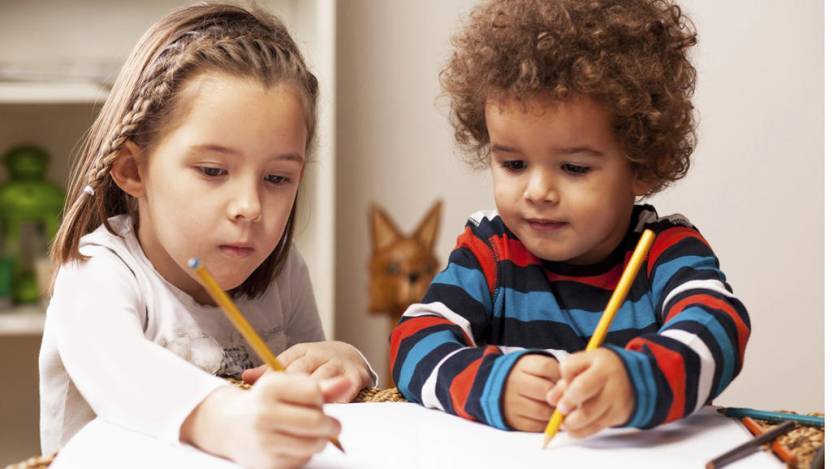
Once you decide your child is ready for preschool, it's time to find a good program. It pays to start your search early. Some families – especially ones who live in big cities – apply to the best schools as soon as their child is born. We kid you not.
After you've identified a few promising schools, apply to all of them. That way, if you don't get into your first choice, you'll have one or two as backup. To find the best program for your child, follow the six steps below.
Identify your priorities
First, decide what you want. Are you looking for a preschool near your workplace, or would one closer to home be more convenient?
Do you want the curriculum to include activities such as dancing and storytelling? Are you looking for a specific approach to learning? (Learn about top five preschool philosophies.)
Do your research
Ask around to find the most reputable preschools. Friends and family can give you the names of schools they like, and we all know that personal references are the best kind.
Ask some experts. The Child Care Aware hotline (800-424-2246) can give you the number of a local childcare resource and referral agency, which in turn can direct you to licensed preschools in your area. Better yet, ask for a list of accredited schools near you. While accreditation isn't a guarantee that a particular preschool will be right for your child, in general, a stamp of approval from the National Association for the Education of Young Children (NAEYC) is a reliable sign of quality childcare.
Go online. Both NAEYC and the National Association of Family Child Care have websites. Visit them for guidelines and contact information. NAEYC also has a searchable online database of accredited centers and preschools.
Check the yellow pages online, too. The yellow pages lists preschools in your area and their websites and allows parents to rate them.
Visit and interview
You can ask a few preliminary questions over the phone (about fees or enrollment, for example), but you won't get a sense of what a preschool is really like until you go there and meet the staff.
Ask the director about everything from hours, fees, and vacation schedules to philosophies on childrearing topics such as discipline and nutrition. Also, get a copy of the daily schedule.
Trust your gut feeling about the place and notice how the director handles your questions. Take along our helpful printable preschool interview sheet on your visits.
When you visit the classrooms, check the teacher-child ratios and note how many children are in a classroom. The NAEYC recommends 2- and 3-year-olds be in groups of no more than 18, with at least two teachers. For 3- to 4-year-olds, the organization recommends groups of 20 or fewer, again with at least two teachers. As many as 20 5-year-olds can be in a class with two or more teachers.
"It's easier to give one-on-one attention and be responsive when there are fewer kids in a room," says Stephanie Glowacki, former director of accreditation programs at NAEYC.
Observe how the teachers interact with the kids: Make sure they're friendly, caring, and encouraging. You'll also want a challenging curriculum, experienced teachers (who are paid well and satisfied with their job), and an environment that's warm, clean, and safe.
Ask about staff turnover. If the teachers change every six months, move on. Children need consistency and the opportunity to form strong relationships with their caregivers, so you don't want a preschool where teachers come and go.
Ultimately, choosing a preschool is a personal decision. If, after visiting a preschool, you love the idea of your child going there, it's probably the right place for you.
"The preschool we chose was strong in arts and music, and the location was convenient," says Winn Ellis, a counselor in San Francisco and mother of two girls. "But what really sold us was the cheerful atmosphere. The kids seem genuinely happy to be there."
For more information about what to look for in a preschool, see our articles on signs of a good preschool and signs of a bad preschool.
Check references
Positive word of mouth is a powerful endorsement. If a preschool has a certain buzz, ask parents what they like about it.
Ask each school you're considering for a list of parents whose children have attended the school. Call them and ask specific questions. Don't just ask whether they like the preschool: Ask exactly what they like about it and what they don't. If their child no longer goes to the school, ask why.
You may also want to call your state's Better Business Bureau to see whether any complaints have been filed against the school or its teachers.
Kid-test it
Visit the school with your child. That way you can see how he and the teachers interact and whether he seems comfortable in the preschool's environment. Do the teachers seem interested in getting to know your child? Does he enjoy the activities?
"I knew we'd made the right decision based on my daughter's reaction," says Svetlana Robledo, a San Francisco journalist. "Nina was brimming with joy after one day there and couldn't stop talking about all the things she was learning and doing."
Get on the waiting list
If the preschool of your dreams has no openings, don't despair. Put yourself on the waiting list, and while you're at it, write a letter explaining why you like the school so much. It won't guarantee you a place, but it can't hurt to let the school know how enthusiastic you are about the program.
In the meantime, if you've applied to more than one school, it's likely you'll have other options to consider.
Resource: https://www.babycenter.com/0_how-to-find-the-best-preschool-for-your-child_64548.bc

 لبنان
لبنان المملكة العربية السعودية
المملكة العربية السعودية البحرين
البحرين الإمارات العربية المتحدة
الإمارات العربية المتحدة قطر
قطر الأردن
الأردن تركيا
تركيا جنوب أفريقيا
جنوب أفريقيا




(0) التعليقات